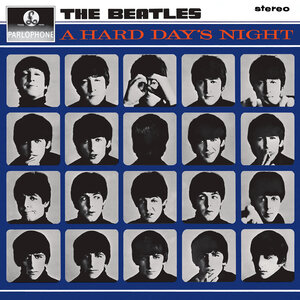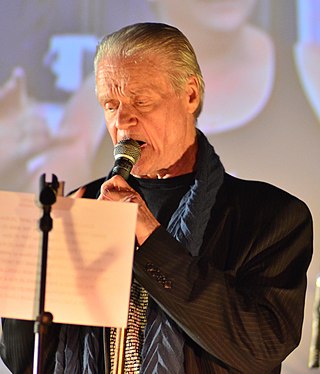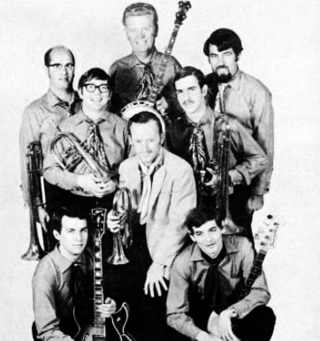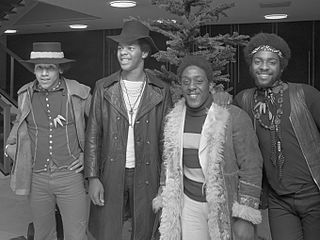
Please Please Me is the debut studio album by the English rock band the Beatles. Produced by George Martin, it was released in the UK on EMI's Parlophone label on 22 March 1963. The album's 14 tracks include cover songs and original material written by the partnership of band members John Lennon and Paul McCartney.

With the Beatles is the second studio album by the English rock band the Beatles. It was released in the United Kingdom on 22 November 1963 on Parlophone, eight months after the release of the band's debut album, Please Please Me. Produced by George Martin, the album features eight original compositions and six covers. The sessions also yielded the non-album single, "I Want to Hold Your Hand" backed by "This Boy". The cover photograph was taken by the fashion photographer Robert Freeman and has since been mimicked by several music groups. A different cover was used for the Australian release of the album, which the Beatles were displeased with.

A Hard Day's Night is the third studio album by the English rock band the Beatles, released on 10 July 1964 by Parlophone, with side one containing songs from the soundtrack to their film of the same name. The American version of the album was released two weeks earlier, on 26 June 1964 by United Artists Records, with a different track listing including some from George Martin's film score. Unlike their first two albums, all 13 tracks on A Hard Day's Night were written by John Lennon and Paul McCartney.

Capitol Records, LLC, and simply known as Capitol, is an American record label owned by Universal Music Group through its Capitol Music Group imprint. It was founded as the first West Coast-based record label of note in the United States in 1942 by Johnny Mercer, Buddy DeSylva, and Glenn E. Wallichs. Capitol was acquired by British music conglomerate EMI as its North American subsidiary in 1955. EMI was acquired by Universal Music Group in 2012, and was merged with the company a year later, making Capitol and the Capitol Music Group both distributed by UMG. The label's circular headquarters building is a recognized landmark of Hollywood, California.

Kim Vincent Fowley was an American record producer, songwriter and musician who was behind a string of novelty and cult pop rock singles in the 1960s, and managed the Runaways in the 1970s. He has been described as "one of the most colorful characters in the annals of rock & roll", as well as "a shadowy cult figure well outside the margins of the mainstream".
Charles Touber is an Australian businessman and tour promoter from Hobart, Tasmania. He is best known as the organiser of the Gone South series of festivals in Launceston and Hobart in the early 2000s, as well as the Southern Roots Festival in Hobart in 2007.
The Crocodiles were a New Zealand pop/new wave band formed in 1979 with lead singer Jenny Morris, who went on to commercial success as a solo artist in Australia; and later included drummer Barton Price, who subsequently joined Sardine v and then Models. The Crocodiles' top 20 hit single in New Zealand was "Tears" in 1980 from debut album Tears; a second album, Looking at Ourselves, appeared in November. The band relocated to Australia in February 1981 but disbanded in July without further releases.

Mark Philipp Wirtz was a German-French pop music record producer, composer, singer, musician, author, and comedian. Wirtz is best known for A Teenage Opera concept album, a project he devised while working under contract to EMI at Abbey Road Studios with Beatles engineer Geoff Emerick. The first single from the planned album, "Excerpt from A Teenage Opera" by Keith West, was a number 2 hit on the UK Singles Chart in September 1967 and encapsulates Wirtz's signature style, described by Mojo magazine as "Phil Spector scoring Camberwick Green". Another track produced and arranged by Wirtz, the 1966 single "A Touch of Velvet - A Sting of Brass" credited to The Mood-Mosaic featuring the Ladybirds, became well-known in Germany as the theme tune for the Radio Bremen television show Musikladen, and was used by some radio stations and DJs in the United Kingdom as an ident, notably Dave Lee Travis on Radio Caroline.

Ricky Fataar is a South African musician of Malay descent who has performed as both a drummer and a guitarist. He gained fame as an actor in The Rutles: All You Need Is Cash, a spoof on the Beatles, in which he performed as a member of the Rutles. He was also a member of the Beach Boys between 1971 and 1974, and has been the drummer for Bonnie Raitt for the last 35 years. Fataar is also a record producer, and has worked on projects scoring music to film and television.

The West Coast Pop Art Experimental Band (WCPAEB) was an American psychedelic rock band formed in Los Angeles, California, in 1965. The group created music that possessed an eerie, and at times sinister atmosphere, and contained material that was bluntly political, childlike, and bizarre. Representing different musical backgrounds among band members, the group, at times, resembled a traditional Byrds-esque folk rock ensemble, but the WCPAEB also, within the same body of work, recorded avant-garde music marked by multi-layered vocal harmonies.
Peter William Dawkins was a New Zealand record producer and musician, best known for his late-1960s to mid-1970s New Zealand hits and his 1970s productions for Australian-based pop artists, including Dragon, Australian Crawl and Air Supply. He won multiple production awards, including the Countdown Producer of the Year. In the late 1980s, he developed Parkinson's disease.
Steel Breeze is an American rock group that had a US hit with the song "You Don't Want Me Anymore" in 1982. This was followed by their single "Dreamin' is Easy" the following year.
Mondo Rock are an Australian rock band, formed in November 1976 in Melbourne, Victoria. Singer-songwriter Ross Wilson founded the band, following the split of his previous band Daddy Cool. Guitarist Eric McCusker, who joined in 1980, wrote many of the band's hits, and along with Wilson formed the core of the group. They are best known for their second album, Chemistry, which was released in July 1981 and peaked at number 2 on the Australian Kent Music Report. Their song "Come Said the Boy" peaked at number 2 in Australia in 1983.

Queens of Noise is the second studio album by the American rock band the Runaways, released on January 7, 1977, through Mercury Records. It is the last album to involve Cherie Currie and Jackie Fox as members of the band.
Ariel were an Australian progressive rock band fronted by Mike Rudd and Bill Putt, who formed the band in 1973 after the breakup of their previous group Spectrum. The original Ariel line-up was Mike Rudd, Bill Putt (bass), Tim Gaze (guitar), John Mills (keyboards) and Nigel Macara (drums). Gaze and Macara were recruited from seminal Australian progressive rock band Tamam Shud. The band released three studio albums and two live albums between 1973 and 1977, during which there were several line-up changes, with Rudd and Putt the only permanent members. Other members of Ariel included guitarists Harvey James and Glyn Mason and keyboard player Tony Slavich.

Danny Davis was an American country music band leader, trumpet player, vocalist and producer, best known as the founder and leader of the Nashville Brass. He is also famous for performing the English theme song of the anime series Speed Racer.
MEO 245 were an Australian new wave band which formed in 1978 in Hobart, Tasmania with Paul Brickhill on keyboards, guitar and vocals; Campbell Laird on drums; Paul Northam on guitar and vocals; and Mick Wilson on bass guitar. Wilson was replaced on bass guitar by Mark Kellett, who in turn was replaced by Anthony Moore. The group issued a sole studio album, Screen Memory, which reached the top 100 of the Kent Music Report Albums Chart.

Pugwash are an Irish pop band fronted by Drimnagh-born musician Thomas Walsh. Pugwash has released six albums since its debut LP Almond Tea in 1999. Influences on the band's sound are regularly cited as including XTC, Electric Light Orchestra and Jeff Lynne, the Beach Boys, the Kinks, Honeybus and the Beatles, though Walsh dismisses the Beatles comparisons as "lazy".

The Real Thing is a British soul group formed in the 1970s. The band charted internationally with their song "You to Me Are Everything", which reached No. 1 on the UK Singles Chart. They also had successes with a string of British hits such as "Can't Get By Without You" and "Can You Feel the Force?". They returned to mainstream success in 1986 with the Decade Remix of "You to Me Are Everything". By number of sales, they were the most successful black rock/soul act in England during the 1970s. The journalist, author and founder of Mojo magazine Paul Du Noyer credits them alongside Deaf School with restoring "Liverpool's musical reputation in the 1970s" with their success.

We'll Sing in the Sunshine is the tenth studio album by Australian-American pop singer Helen Reddy that was released in 1978 by Capitol Records. The album included two songs that were also covered by Johnny Mathis in the first half of that year: "All I Ever Need", which came out on his March release, You Light Up My Life, and "Ready or Not", on which he duetted with Deniece Williams for their June release, That's What Friends Are For. Reddy also ventures into Beatles territory with their rockabilly number "One After 909" and takes on Jeff Lynne's "Poor Little Fool" with accompaniment in the vein of Electric Light Orchestra. This was her first album not to reach Billboard's Top LP's & Tapes chart. On February 23, 2010, it was released for the first time on compact disc as one of two albums on one CD, the other album being her 1977 release, Ear Candy. "Blue" was originally featured on the 1977 animated film Raggedy Ann & Andy: A Musical Adventure.











